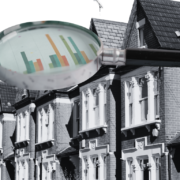The temperature check on the financial markets shows the mercury rising as recession worries ease off amid some signs of consumer resilience.
The FTSE 100 has opened 1% higher, taking the lead from Asia and Wall Street on Friday.
Although stronger than expected, US retail sales released at the end of the week were partly driven by higher prices rather than the confidence of shoppers to pile more in baskets.
The data helped assuage unease about looming recessions.
Supply concerns have once again overtaken anxiety about weakening demand on oil markets, with Brent Crude edging back up above $103 a barrel, helping lift share prices of energy giants in early trade.
There are no signs of imminent breakthroughs in efforts by the US administration to persuade Gulf States to pump more oil, and there is increased uncertainty about the impact of a possible price cap on Russian crude as the Ukraine war as Moscow prepares for its next offensive.
These factors are conspiring to push up prices, even though worries are still lingering about fresh outbreaks of Covid cases in China, with the zero-Covid strategy still threatening to lead to fresh supply chain snarl ups and lower demand for oil.
With investors seeming willing to take more risks, the safe haven dollar has nudged back a little, with the euro gaining some ground to trying to escape parity, trading at just above $1.01.
The European Central Bank meeting on Thursday will be closely watched given its so behind the curve in raising rates, causing added weakness for the euro.
A 25 basis points hike is expected for the first time in 11 years, and investors will be clinging onto clues about the future path.
The big difficulty overhanging the Eurozone, and particularly gas-guzzling countries like Germany, is that the Nordstream 1 pipeline won’t reopen as planned on Thursday.
Any hint of that could see fresh weakness in the euro given the damaging effect derailed supplies would have on economies.
The pound also edged up above $1.19 but is still languishing around lows not seen since the first days of the pandemic.
Political uncertainty rumbles on in the UK, with increasingly fractious debates between the Prime ministerial contenders exposing the rifts in the ruling Conservative party, when it comes to fiscal policies.
With the cost-of-living crisis preoccupying votes, pledges of tax cuts are coming thick and fast from contenders hoping to upset the front-runner former Chancellor Rishi Sunak’s chances to get to the keys to No.10 Downing Street.
With consumers in the UK showing signs of tightening the purse strings and being increasingly cost conscious, it’s little surprise that Deliveroo has dramatically cut its forecasts for gross transactional value this year.
Expensive takeaways are likely to be among the first treats to fall by the wayside as households grapple with soaring bills especially as higher costs are feeding through to pricier menus.
Deliveroo has slashed its guidance for growth by more than half, to 12% compared to previous estimates of up to 25%.
Tighter cost control is now set to be the focus for the company as it deals with the headwinds, with marketing budgets set to be reined in.
Johnson Matthey’s planned metamorphosis to align itself with the greener auto business is taking on shape with plans for a £80 million gigafactory at its existing site in Royston, UK, to scale up the manufacture of hydrogen fuel cell components.
After shedding its skin as a battery materials player, worries had increased about a lack of direction for the company given its core catalytic business has such an obvious shelf life, but the announcement will assuage concerns that it will have future relevance.
Embarking on a new business venture is expensive and there’s no guarantee it will pan out hence the lukewarm share price reaction but it’s a sign that the group is intent on finding new avenues for growth.
Haleon has completed its historic demerger from GSK, listing on the London Stock Exchange today with a share price of 330p.
This values the company at £30.9 billion.
There may be a volatile period of trading ahead for the company particularly due to the cost inflation which has whipped up across the consumer goods industry.
But given its successful products, such as Sensodyne toothpaste and Advil and Voltaren pain killers, are household names, the brand pulling power of this new consumer big beast should help it hang onto customers, who may trade down other products in shopping baskets instead.
























Comments